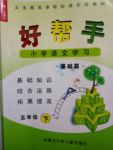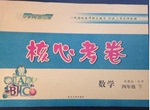题目内容
The boy slipped out of the room and headed for the swimming pool without his parents' _____.
A. command B. conviction C. consent D. compromise
C
解析:
consent 同意, 赞成, 答应。conviction 深信, 确信。compromise 妥协, 折中。 command 命令, 指令; 掌握, 运用能力。

 小学学习好帮手系列答案
小学学习好帮手系列答案 小学同步三练核心密卷系列答案
小学同步三练核心密卷系列答案One afternoon in January in 1998, Susan Sharp, 43, and her 8-year-old son David, were walking across an icy square, when Susan’s cane(手杖) slipped on the ice. Her face 36 first into the mud. David 37 her mother’s side, “Are you all right, Mom” 38 , Susan pulled herself up, “I’m okay, Honey,” she said.
Susan was falling more 39 since she had trouble walking. Every inch of ice was a 40 danger for her. “I wish I could do something,” the boy thought. David, too, was having 41 of his own. The boy had a speech problem, so at school he talked 42 .
One day, David’s teacher announced a 43 homework. "Each of you is going to come up with an 44 ," she said. This was for "INVENT AMERICA", a national competition to encourage creativity in children.
An idea 45 David one evening. If only his mother’s cane didn’t slip on the ice. “What if I 46 your cane to a nail coming out of the bottom” he asked his mother.
“ 47 the sharp end would scratch(划破) floors,” Susan said.
“No, Mom, I 48 make it like a ball-point pen. You take your hand off the button and the 49 returns back up.” Hours later the cane was finished. David and his father 50 as Susan used it to walk 50 feet about the 51 . Happily Susan cried out, “It 52 !”
In July 1999, David was 53 national winner for the "INVENT AMERICA". David began to make public appearance. Thus he was forced to communicate 54 .Today, David is nearly free of his speech problem, and his 55 is becoming well accepted.
| 1. A. fell | B. touched | C. lay | D. dropped |
| 2. A. stood by | B. rushed to | C. looked at | D. ran around |
| 3. A. Firmly | B. Easily | C. Quickly | D. Shakily |
| 4. A. slowly | B. frequently | C. freely | D. heavily |
| 5. A. hiding | B. certainly | C. possible | D. waiting |
| 6. A. method | B. disease | C. trouble | D. hope |
| 7. A. few | B. little | C. much | D. more |
| 8. A. useful | B. strange | C. common | D. special |
| 9. A. appearance | B. invention | C. experience | D. experiment |
| 10. A. reminded | B. encouraged | C. occurred | D. hit |
| 11. A. fastened | B. stuck | C. fixed | D. tied |
| 12. A. So | B. And | C. For | D. But |
| 13. A. might | B. would | C. did | D. need |
| 14. A. pen | B. hand | C. cane | D. nail |
| 15. A. watched | B. supported | C. noticed | D. helped |
| 16. A. street | B. ice | C. yard | D. square |
| 17. A. works | B. operates | C. succeeds | D. helps |
| 18. A. declared | B. received | C. won | D. praised |
| 19. A. more slowly | B. more carefully | C. more clearly | D. faster |
| 20. A. cane | B. mother | C. speech | D. story |
One afternoon in January in 1998, Susan Sharp, 43, and her 8-year-old son David, were walking across an icy square, when Susan's cane(手杖) slipped on the ice. Her face 36 first into the mud. David 37 her mother's side, “Are you all right, Mom” 38 , Susan pulled herself up, “I'm okay, Honey,” she said.
Susan was falling more 39 since she had trouble walking. Every inch of ice was a 40 danger for her. “I wish I could do something,” the boy thought. David, too, was having 41 of his own. The boy had a speech problem, so at school he talked 42 .
One day, David's teacher announced a 43 homework. "Each of you is going to come up with an 44 ," she said. This was for "INVENT AMERICA", a national competition to encourage creativity in children.
An idea 45 David one evening. If only his mother's cane didn't slip on the ice. “What if I 46 your cane to a nail coming out of the bottom” he asked his mother.
“ 47 the sharp end would scratch(划破) floors,” Susan said.
“No, Mom, I 48 make it like a ball-point pen. You take your hand off the button and the 49 returns back up.” Hours later the cane was finished. David and his father 50 as Susan used it to walk 50 feet about the 51 . Happily Susan cried out, “It 52 !”
In July 1999, David was 53 national winner for the "INVENT AMERICA". David began to make public appearance. Thus he was forced to communicate 54 .Today, David is nearly free of his speech problem, and his 55 is becoming well accepted.
|
1. A. fell |
B. touched |
C. lay |
D. dropped |
|
2. A. stood by |
B. rushed to |
C. looked at |
D. ran around |
|
3. A. Firmly |
B. Easily |
C. Quickly |
D. Shakily |
|
4. A. slowly |
B. frequently |
C. freely |
D. heavily |
|
5. A. hiding |
B. certainly |
C. possible |
D. waiting |
|
6. A. method |
B. disease |
C. trouble |
D. hope |
|
7. A. few |
B. little |
C. much |
D. more |
|
8. A. useful |
B. strange |
C. common |
D. special |
|
9. A. appearance |
B. invention |
C. experience |
D. experiment |
|
10. A. reminded |
B. encouraged |
C. occurred |
D. hit |
|
11. A. fastened |
B. stuck |
C. fixed |
D. tied |
|
12. A. So |
B. And |
C. For |
D. But |
|
13. A. might |
B. would |
C. did |
D. need |
|
14. A. pen |
B. hand |
C. cane |
D. nail |
|
15. A. watched |
B. supported |
C. noticed |
D. helped |
|
16. A. street |
B. ice |
C. yard |
D. square |
|
17. A. works |
B. operates |
C. succeeds |
D. helps |
|
18. A. declared |
B. received |
C. won |
D. praised |
|
19. A. more slowly |
B. more carefully |
C. more clearly |
D. faster |
|
20. A. cane |
B. mother |
C. speech |
D. story |